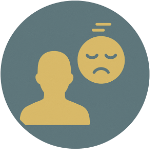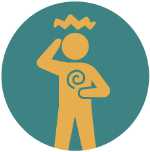When the Diagnosis Doesn’t Fit
A Place for TCM in the “In-Between” Conditions
When the Diagnosis Doesn’t
Match the Experience
If you’ve been told your labs are fine but you still feel unwell, you’re not alone. These are just a few examples of “in-between” conditions where TCM may offer relief, even without a formal Western diagnosis:
- Chronic fatigue or “crashes” despite normal test results
- Brain fog, forgetfulness, or trouble focusing
- Digestive symptoms that change daily—bloating, gas, loose stools, constipation
- Sleep troubles, especially waking at the same time each night
- Anxiety or mood swings with no clear psychological label
- Ongoing body aches, tension, or low-grade pain
- Cold hands and feet, or sensitivity to temperature
- Feeling emotionally “off,” disconnected, or flat
TCM doesn’t require a diagnosis to help.
Instead, it focuses on the pattern—the unique way your symptoms present—and gently works to restore internal balance. When your story doesn’t fit into a single medical label, TCM helps fill in the gaps.
It’s a frustrating, but familiar story: the tests are normal, the scans are clear, and yet—something is still wrong. You’re tired all the time, your digestion is unpredictable, your pain moves without reason, or your mind feels foggy and unfocused. You’re told it’s “probably stress,” “nothing serious,” or worse—“just part of aging.” And you start to wonder: is there anything else I can do?
This is where many people turn to Traditional Chinese Medicine (TCM)—not because they’re rejecting Western care, but because they’re searching for something it hasn’t yet explained.
When Symptoms Don’t Fit the Box
Western medicine is powerful when symptoms point clearly to a diagnosis—appendicitis, diabetes, a broken bone. But for conditions that don’t show up on lab work or follow predictable patterns, it can fall short. People with chronic fatigue, vague digestive issues, post-viral syndromes, migraines, mild autoimmune symptoms, or medication side effects may go years without satisfying answers.
It’s not that Western medicine doesn’t care—it’s that the system is built to find and fix concrete problems. If your symptoms are real but hard to quantify, you may end up in an in-between space, managing discomfort but not feeling heard.
A Different Way of Listening
TCM doesn’t rely on lab values or imaging to understand what’s happening. Instead, it listens deeply to how the body is functioning as a whole. How’s your sleep? What’s your appetite like? Do you wake at the same time each night? What’s the quality of your energy, your mood, your voice?
The practitioner may ask about temperature sensitivity, emotional shifts, dreams, cravings, or your reaction to weather. Your tongue and pulse are examined for signs of imbalance—no devices needed. These observations form the basis for a pattern diagnosis, which guides treatment.
Even without a Western name for your condition, you can still receive meaningful care.
Not Everything Needs a Label
One of the strengths of TCM is that it doesn’t require a diagnosis to begin helping you. You don’t need to “have IBS” to be treated for bloating or sluggish digestion. You don’t need to be diagnosed with “anxiety” to receive help for sleep, irritability, or racing thoughts. In fact, many people who feel “off” or stuck between labels respond well to TCM because the system treats the person, not the disease.
This doesn’t mean ignoring medical red flags or avoiding testing—it means expanding the options when testing doesn’t tell the full story.
Treating the Whole Picture
A TCM treatment plan may include:
- Acupuncture, to move qi, calm the nervous system, and support function.
- Herbal medicine, tailored to your individual presentation and adjusted over time.
- Dietary suggestions, not just about what to avoid, but how to eat in a way that supports your constitution.
- Movement or breathwork, if energy needs grounding or circulation needs support.
These therapies are not one-size-fits-all, and they’re not about masking symptoms. They’re about helping your body regain rhythm and strength from the inside out.
When You Feel Stuck, TCM Can Offer a Path Forward
You don’t have to wait for a diagnosis to begin feeling better. Many people explore TCM after months or years of chasing a label—and find that relief comes from being seen, not sorted.
This isn’t an either-or decision. You can continue seeing your doctor, taking your medications, and getting your checkups while also exploring TCM’s gentle, whole-person approach. When conventional care doesn’t explain everything, it’s okay to look elsewhere for support.
You’re not imagining things. You’re not overreacting. And you’re not alone.





